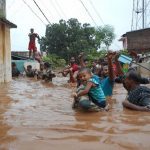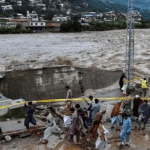The death toll from flash flooding in Germany and Belgium has surpassed 180, as rescue workers dig deeper into debris to search for victims and prevent further damage.
The death toll in Germany has grown to 155 confirmed deaths, with 27 confirmed deaths in Belgium, but there are fears that the figure could yet rise, according to officials.
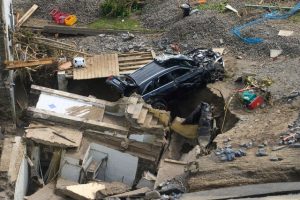
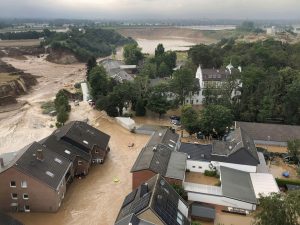
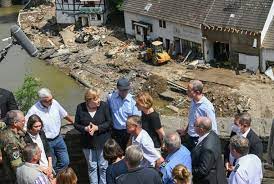
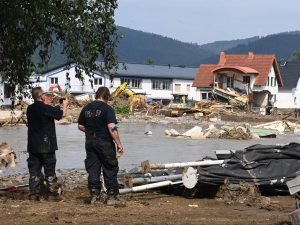
As the floodwaters recede, the German military has begun using armoured vehicles to take out automobiles and trucks that have been flooded, with rescue workers checking inside for casualties.
It comes after days of heavy rain turned normally small rivers and streets into roaring torrents, causing catastrophic floods that swept away cars, wrecked homes, and stranded individuals this week.
Communication links in some places are still down and there are fears the weather could worsen but the water is receding in many affected parts.
Chancellor Angela Merkel is scheduled to visit Schuld, one of the hardest hit villages in Germany, on Sunday, having returned from a trip to America.
She will discuss plans on how to rebuild the country with regional and federal authorities later this week. Her finance minister has estimated at least 300 million euros (£257 million) of immediate aid is needed.
Merkel said earlier in the week from the White House in the US: “My thoughts at this time are with those back home, from here I want to send them a sign of condolence and solidarity.
“I hope my messages reach my European colleagues, who can show solidarity with Germany and offer their help.
“Hundreds of thousands of people all of a sudden were faced with catastrophe, their houses were literally death traps, small rivers turned into flooded, devastating rivers.
“My empathy and my heart goes out to all of those who in this catastrophe lost their loved ones, or who are still worrying about the fate of people still missing and I include Belgium, Luxembourg and the Netherlands who have also suffered from flooding.”
The death toll from flash flooding in Germany and Belgium has surpassed 180, as rescue workers dig deeper into debris to search for victims and prevent further damage.
The death toll in Germany has grown to 155 confirmed deaths, with 27 confirmed deaths in Belgium, but there are fears that the figure could yet rise, according to officials.




As the floodwaters recede, the German military has begun using armoured vehicles to take out automobiles and trucks that have been flooded, with rescue workers checking inside for casualties.
It comes after days of heavy rain turned normally small rivers and streets into roaring torrents, causing catastrophic floods that swept away cars, wrecked homes, and stranded individuals this week.
Communication links in some places are still down and there are fears the weather could worsen but the water is receding in many affected parts.
Chancellor Angela Merkel is scheduled to visit Schuld, one of the hardest hit villages in Germany, on Sunday, having returned from a trip to America.
She will discuss plans on how to rebuild the country with regional and federal authorities later this week. Her finance minister has estimated at least 300 million euros (£257 million) of immediate aid is needed.
Merkel said earlier in the week from the White House in the US: “My thoughts at this time are with those back home, from here I want to send them a sign of condolence and solidarity.
“I hope my messages reach my European colleagues, who can show solidarity with Germany and offer their help.
“Hundreds of thousands of people all of a sudden were faced with catastrophe, their houses were literally death traps, small rivers turned into flooded, devastating rivers.
“My empathy and my heart goes out to all of those who in this catastrophe lost their loved ones, or who are still worrying about the fate of people still missing and I include Belgium, Luxembourg and the Netherlands who have also suffered from flooding.”
The death toll from flash flooding in Germany and Belgium has surpassed 180, as rescue workers dig deeper into debris to search for victims and prevent further damage.
The death toll in Germany has grown to 155 confirmed deaths, with 27 confirmed deaths in Belgium, but there are fears that the figure could yet rise, according to officials.




As the floodwaters recede, the German military has begun using armoured vehicles to take out automobiles and trucks that have been flooded, with rescue workers checking inside for casualties.
It comes after days of heavy rain turned normally small rivers and streets into roaring torrents, causing catastrophic floods that swept away cars, wrecked homes, and stranded individuals this week.
Communication links in some places are still down and there are fears the weather could worsen but the water is receding in many affected parts.
Chancellor Angela Merkel is scheduled to visit Schuld, one of the hardest hit villages in Germany, on Sunday, having returned from a trip to America.
She will discuss plans on how to rebuild the country with regional and federal authorities later this week. Her finance minister has estimated at least 300 million euros (£257 million) of immediate aid is needed.
Merkel said earlier in the week from the White House in the US: “My thoughts at this time are with those back home, from here I want to send them a sign of condolence and solidarity.
“I hope my messages reach my European colleagues, who can show solidarity with Germany and offer their help.
“Hundreds of thousands of people all of a sudden were faced with catastrophe, their houses were literally death traps, small rivers turned into flooded, devastating rivers.
“My empathy and my heart goes out to all of those who in this catastrophe lost their loved ones, or who are still worrying about the fate of people still missing and I include Belgium, Luxembourg and the Netherlands who have also suffered from flooding.”
The death toll from flash flooding in Germany and Belgium has surpassed 180, as rescue workers dig deeper into debris to search for victims and prevent further damage.
The death toll in Germany has grown to 155 confirmed deaths, with 27 confirmed deaths in Belgium, but there are fears that the figure could yet rise, according to officials.




As the floodwaters recede, the German military has begun using armoured vehicles to take out automobiles and trucks that have been flooded, with rescue workers checking inside for casualties.
It comes after days of heavy rain turned normally small rivers and streets into roaring torrents, causing catastrophic floods that swept away cars, wrecked homes, and stranded individuals this week.
Communication links in some places are still down and there are fears the weather could worsen but the water is receding in many affected parts.
Chancellor Angela Merkel is scheduled to visit Schuld, one of the hardest hit villages in Germany, on Sunday, having returned from a trip to America.
She will discuss plans on how to rebuild the country with regional and federal authorities later this week. Her finance minister has estimated at least 300 million euros (£257 million) of immediate aid is needed.
Merkel said earlier in the week from the White House in the US: “My thoughts at this time are with those back home, from here I want to send them a sign of condolence and solidarity.
“I hope my messages reach my European colleagues, who can show solidarity with Germany and offer their help.
“Hundreds of thousands of people all of a sudden were faced with catastrophe, their houses were literally death traps, small rivers turned into flooded, devastating rivers.
“My empathy and my heart goes out to all of those who in this catastrophe lost their loved ones, or who are still worrying about the fate of people still missing and I include Belgium, Luxembourg and the Netherlands who have also suffered from flooding.”
The death toll from flash flooding in Germany and Belgium has surpassed 180, as rescue workers dig deeper into debris to search for victims and prevent further damage.
The death toll in Germany has grown to 155 confirmed deaths, with 27 confirmed deaths in Belgium, but there are fears that the figure could yet rise, according to officials.




As the floodwaters recede, the German military has begun using armoured vehicles to take out automobiles and trucks that have been flooded, with rescue workers checking inside for casualties.
It comes after days of heavy rain turned normally small rivers and streets into roaring torrents, causing catastrophic floods that swept away cars, wrecked homes, and stranded individuals this week.
Communication links in some places are still down and there are fears the weather could worsen but the water is receding in many affected parts.
Chancellor Angela Merkel is scheduled to visit Schuld, one of the hardest hit villages in Germany, on Sunday, having returned from a trip to America.
She will discuss plans on how to rebuild the country with regional and federal authorities later this week. Her finance minister has estimated at least 300 million euros (£257 million) of immediate aid is needed.
Merkel said earlier in the week from the White House in the US: “My thoughts at this time are with those back home, from here I want to send them a sign of condolence and solidarity.
“I hope my messages reach my European colleagues, who can show solidarity with Germany and offer their help.
“Hundreds of thousands of people all of a sudden were faced with catastrophe, their houses were literally death traps, small rivers turned into flooded, devastating rivers.
“My empathy and my heart goes out to all of those who in this catastrophe lost their loved ones, or who are still worrying about the fate of people still missing and I include Belgium, Luxembourg and the Netherlands who have also suffered from flooding.”
The death toll from flash flooding in Germany and Belgium has surpassed 180, as rescue workers dig deeper into debris to search for victims and prevent further damage.
The death toll in Germany has grown to 155 confirmed deaths, with 27 confirmed deaths in Belgium, but there are fears that the figure could yet rise, according to officials.




As the floodwaters recede, the German military has begun using armoured vehicles to take out automobiles and trucks that have been flooded, with rescue workers checking inside for casualties.
It comes after days of heavy rain turned normally small rivers and streets into roaring torrents, causing catastrophic floods that swept away cars, wrecked homes, and stranded individuals this week.
Communication links in some places are still down and there are fears the weather could worsen but the water is receding in many affected parts.
Chancellor Angela Merkel is scheduled to visit Schuld, one of the hardest hit villages in Germany, on Sunday, having returned from a trip to America.
She will discuss plans on how to rebuild the country with regional and federal authorities later this week. Her finance minister has estimated at least 300 million euros (£257 million) of immediate aid is needed.
Merkel said earlier in the week from the White House in the US: “My thoughts at this time are with those back home, from here I want to send them a sign of condolence and solidarity.
“I hope my messages reach my European colleagues, who can show solidarity with Germany and offer their help.
“Hundreds of thousands of people all of a sudden were faced with catastrophe, their houses were literally death traps, small rivers turned into flooded, devastating rivers.
“My empathy and my heart goes out to all of those who in this catastrophe lost their loved ones, or who are still worrying about the fate of people still missing and I include Belgium, Luxembourg and the Netherlands who have also suffered from flooding.”
The death toll from flash flooding in Germany and Belgium has surpassed 180, as rescue workers dig deeper into debris to search for victims and prevent further damage.
The death toll in Germany has grown to 155 confirmed deaths, with 27 confirmed deaths in Belgium, but there are fears that the figure could yet rise, according to officials.




As the floodwaters recede, the German military has begun using armoured vehicles to take out automobiles and trucks that have been flooded, with rescue workers checking inside for casualties.
It comes after days of heavy rain turned normally small rivers and streets into roaring torrents, causing catastrophic floods that swept away cars, wrecked homes, and stranded individuals this week.
Communication links in some places are still down and there are fears the weather could worsen but the water is receding in many affected parts.
Chancellor Angela Merkel is scheduled to visit Schuld, one of the hardest hit villages in Germany, on Sunday, having returned from a trip to America.
She will discuss plans on how to rebuild the country with regional and federal authorities later this week. Her finance minister has estimated at least 300 million euros (£257 million) of immediate aid is needed.
Merkel said earlier in the week from the White House in the US: “My thoughts at this time are with those back home, from here I want to send them a sign of condolence and solidarity.
“I hope my messages reach my European colleagues, who can show solidarity with Germany and offer their help.
“Hundreds of thousands of people all of a sudden were faced with catastrophe, their houses were literally death traps, small rivers turned into flooded, devastating rivers.
“My empathy and my heart goes out to all of those who in this catastrophe lost their loved ones, or who are still worrying about the fate of people still missing and I include Belgium, Luxembourg and the Netherlands who have also suffered from flooding.”
The death toll from flash flooding in Germany and Belgium has surpassed 180, as rescue workers dig deeper into debris to search for victims and prevent further damage.
The death toll in Germany has grown to 155 confirmed deaths, with 27 confirmed deaths in Belgium, but there are fears that the figure could yet rise, according to officials.




As the floodwaters recede, the German military has begun using armoured vehicles to take out automobiles and trucks that have been flooded, with rescue workers checking inside for casualties.
It comes after days of heavy rain turned normally small rivers and streets into roaring torrents, causing catastrophic floods that swept away cars, wrecked homes, and stranded individuals this week.
Communication links in some places are still down and there are fears the weather could worsen but the water is receding in many affected parts.
Chancellor Angela Merkel is scheduled to visit Schuld, one of the hardest hit villages in Germany, on Sunday, having returned from a trip to America.
She will discuss plans on how to rebuild the country with regional and federal authorities later this week. Her finance minister has estimated at least 300 million euros (£257 million) of immediate aid is needed.
Merkel said earlier in the week from the White House in the US: “My thoughts at this time are with those back home, from here I want to send them a sign of condolence and solidarity.
“I hope my messages reach my European colleagues, who can show solidarity with Germany and offer their help.
“Hundreds of thousands of people all of a sudden were faced with catastrophe, their houses were literally death traps, small rivers turned into flooded, devastating rivers.
“My empathy and my heart goes out to all of those who in this catastrophe lost their loved ones, or who are still worrying about the fate of people still missing and I include Belgium, Luxembourg and the Netherlands who have also suffered from flooding.”







